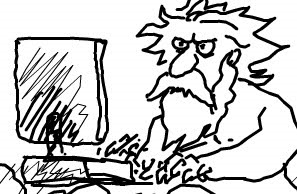In this passage from the book "Free Fall," William Golding discusses the idea of original sin in the context of the narrator Samuel Mountjoy. Mountjoy has, "lost his freedom," in a way that is an unmistakable reference to "the fall" in the book of genesis.
The passage really revolves around the idea of free will. Free will is described as possessing, "no guilt." Initially it is discussed in the benign context of a day in the park, and the simple, albeit enlightening experience of choosing between two paths. It is the choosing of one of the paths that sets Mountjoy free, yet ironically, his pre-possession of free will was required to do so.
This is innocence, an innocence reflective of Adam and Eve before the fall. They possessed the free will to do as they pleased, but did not make any decisions that had any negative effect, therefore leaving them in a childlike state of invincibility. Here it is interesting to recall that in Golding's most famous book, "Lord of the Flies," a central theme is that childhood is not so innocent as we should presume." Free will only sets us free until it imprisons us.
The second piece of free will in the passage, the choice of a hat, seems and is as random as the choice of two paths in the park. Yet in this one the free will that he relished steals his freedom. Here Golding introduces a strong piece of irony prevalent in the Bible and the world as a whole: the idea that through our inerrant free will we are given the tools to loose our freedom. This is what happened to Adam and Eve. It was their CHOICE to eat the apple, and they are according kicked out of Eden. As Golding says, "we are dumb and blind, but must eat." We are free to do as we choose, but must restrain our free will from getting too lofty, for there will always be a will freer than our own.
Choosing a hat also reflects on the arbitrary nature of the fall. Just a Mountjoy did not have his freedom taken for murder or theft, Adam and Eve lost theirs to a mundane and seemingly random act. What is most dangerous about our free will is that, even when constraining it, we can still make choices that seem unimportant in the present, but become disastrous in the future. This is the human error and even human evil that religion has spent its history tripping over itself to explain.

Kierkegaard famously observed, "Pleasure disappoints, possibility, never!" Is free will just a tease? Do we exhaust it just as soon as we exercise it? (The choice of paths would seem support this, though the hats can be taken up and taken off again and again).
ReplyDeleteNice post. I'm interested in how you think Golding works knowledge (through all those references to books) into this.